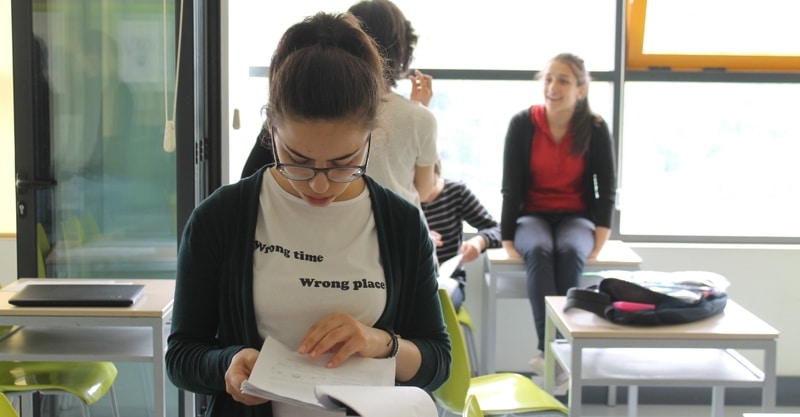The Araratian Baccalaureate is an academically rigorous high school qualification developed by the Ayb Educational Foundation as part of the National Program for Educational Excellence (NPEE), an Armenian public education program established with the advice and support of the Armenian Ministry of Education and Science and implemented in collaboration with leading international partners in the field of education. On December 29, 2015, (Ministerial Decree No. 1073-Ա/Ք) the Armenian Ministry of Education confirmed the Araratian Baccalaureate as an alternative high school education program for Armenia's public school system. In September 2016, the AB was benchmarked by UK's National Recognition Information Centre (UK NARIC) to be comparable to UK GCE A Level and US AP qualifications. On December 15, 2016 RA Government amended No. 597-N Decree (April 26, 2012), adding the Araratian Baccalaureate (AB) exams to the official admissions examinations for Armenian universities. In 2017 Ayb Educational Foundation has issued a decree (N Ա-09-06-2017), designated the Araratian Baccalaureate Examination Center as the official body for conducting the AB exams.
In September 2016, the AB was benchmarked by UK's National Recognition Information Centre (UK NARIC) and found comparable to leading international educational programs such as the UK GCE A Level and US Advanced Placement (AP).
The AB Diploma is intended as a baccalaureate style award (3-year high school program), including a number of subjects offered at two levels; Extended and Standard together with Project-based Learning, which extends the skills and subject knowledge acquired through the main subject areas included in the AB curriculum. All subjects, apart from English and Russian languages, are taught and assessed in Armenian.
The Araratian Baccalaureate is an academically rigorous program designed for a selected high-performing national cohort and offered during the last 3 years of the 12-year Armenian comprehensive public education system. Compared to the standard state program, AB students study extended hours, during the week and on Saturdays.
“Pitched at upper secondary level, the AB, GCE A Level and AP all assume a degree of prior knowledge and skills on entry. However, whilst the AB is intended for the highest achieving students in Armenia, selected through an admissions exam, A Levels and APs are taken by students with a comparably broader range of abilities and backgrounds.” UK NARIC Benchmarking Report, August 2016
All AB students take Project-based Learning (PBL). Projects are selected and designed by students and are required to have social impact. Projects are a well-structured interdisciplinary activity carried out by students in teams with the guidance of a mentor. PBL assesses communication and problem-solving skills through a presentation, self-reflection and team-work.
Extended Subjects aim to give students a rigorous and in-depth understanding of the subject and related skills and require a minimum of 360 guided learning hours.
All students must take Extended Armenian Studies and English Language (the English language requirement at graduation is at least CEFR level B2) and one additional Extended Subject of their choice, but not more than two. Students may choose from Extended Mathematics, Extended Biology, Extended Chemistry, Extended Physics, and starting in 2019, Extended History. Students taking two additional Extended Subjects will be eligible for graduation with honors.
Extended Armenian Studies is an integrated curriculum comprising Armenian language, literature, history and culture, emphasizing oral and written communication, critical thinking skills, weighing of evidence, cultural appreciation, and a sense of historical responsibility.
In addition to Extended Subjects, starting in 11th grade, students must take one or more Standard Subjects. Standard Subjects require a minimum of 180 guided learning hours. They are designed to allow students to explore their interests and assure a well-rounded education.
In 10th grade, standard level courses in Arts, Social Sciences and Russian language are required for all students. Russian language is assessed by State examination to assure that a minimum CEFR A2 level is achieved. Physical Education is mandatory across all 3 years.
The following is a sampling of Standard Subjects. Offerings may vary from school to school.
Formative and summative assessment is employed throughout the AB Diploma programme. Formative assessment comprises homework, coursework and in-class tests. Each student comprises a portfolio together with their teacher and gets feedback based on the portfolio progress. No grades are issued to students during the learning process besides summative tests taken twice a year (one interim and one final for the course).
AB summative assessment, including final graduation exams, is carried out by an independent examination center, the Araratian Baccalaureate Examination Center (ABEC), established by the National Program for Educational Excellence with close supervision by Cambridge International Examinations.
The ABEC is working in collaboration with Cambridge International Examinations on assessment of Extended Subjects.
Students who have successfully passed the Extended examinations in Mathematics, Biology, Chemistry and Physics will receive a certificate with the following wording on the reverse of the certificate:
Armenian Studies is assessed internally and validated through ABEC Exam. English is assessed internally and validated through State or international exams. Students applying internationally are expected to take IELTS as evidence of English language proficiency. Starting in 2019, the AB plans to introduce Extended History comparable to GCA A Level.
